- Home
- André Aciman
Harvard Square Page 13
Harvard Square Read online
Page 13
The coffeepot that morning was stuck shut. So I banged it against the kitchen counter. Then, to empty the hardened coffee grinds, I opened the service door, lifted the top of the trash container on my landing, and gently banged the metal funnel filter against it, once, twice. My neighbor opened her service door right away. “Did you knock?” she asked. “No,” I said, apologizing for the noise. “I was just emptying the coffee grinds,” I said showing her the funnel as proof I wasn’t lying. “The last time I made coffee using this thing was months ago.”
“Oh,” she said. Then because I stood there, hesitating to shut my kitchen door before she had shut hers, she asked why I was up so early.
“Work,” I said. “What about you?”
Work too, she smiled.
“Funny, though,” she said, “I happened to see your light late last night and wondered about you.”
Was this the equivalent of telling a man she’s dreamed of him?
“What did you think?”
“Nothing.”
“Good or bad?”
“Nothing special, really.”
I still did not shut the door though I could tell from her body language that she was about to shut hers.
“Tell me the next time we meet then.”
But I still didn’t signal I was shutting the door. I just stood there with parts of the dirty coffeepot in both hands. “It’s a promise then.”
She smiled but did not answer, and because she did not answer I knew at that moment that she knew about Linda and me and that she’d make sure to open her kitchen door in three days at the latest, unless she was like the Princesse de Clèves and would never open it again when she was alone in her kitchen precisely because she was dying to throw it wide open. Then, if indeed she was like the Princess, she’d tell her boyfriend, not what she had done one afternoon when he was away at work and I’d knocked and asked to borrow, say, a bottle opener, but that she had intentionally resisted opening the kitchen door because she knew who was knocking and didn’t trust herself.
I WENT TO meet Lloyd-Greville that morning at 10:00 feeling buoyed and uplifted not by my readiness to discuss Chaucer but by what had happened at 5:00 that very morning. And perhaps it was because I was in such high spirits that I must have persuaded Lloyd-Greville I was more than prepared to take my comprehensives that coming January. As I was stepping out of his office, he handed my file to Mary-Lou, saying “Our friend here could, if he wished, write a dissertation on Chaucer.” Lloyd-Greville was always stingy when it came to praise; he preferred compliments by proxy, by speaking to you via someone else, by not even looking at you. I went home, unplugged my phone, and threw myself on my sunbathed bed totally naked.
4
THE INDIAN SUMMER WASN’T LETTING GO, EVEN AS September dragged on into early October. Mornings were chilly, but by midmorning the weather would grow warm, then unbearably hot, and then quite cool again. Ersatz weather, Kalaj called it. Why should this surprise anyone? Everything about this place was sham, bogus, fake, phony, counterfeit. Contrefaçon, he’d say, meaning that everything was counterfeit in America. Still, I liked the extended illusion of spring weather with its heady presage of summer oddly trailing on the last, first days of fall. It took me back to spring break, when summer was still weeks away. I remembered the end of the academic year. Back then I had drawn up lists of books to read or reread and had just discovered the use of the terrace upstairs. My friends Frank and Claude were still in town and Nora hadn’t even left for Europe yet. Nora, when she wasn’t with Frank, would come by sometimes and cook a Cornish hen for the two of us, though we both knew that she was coming simply to vent about how hard Frank was to live with and how she couldn’t wait to be without him for a while, which is why the two had decided to spend their summer away. The whole thing with the Cornish hen and the half-liter bottle of wine always ended up in tears. One evening we’d gone to see Annie Hall in Boston. She kept laughing; I couldn’t begin to understand why, and finally decided that perhaps Frank was right, there was something wrong with her. It never occurred to me that I had not yet grasped Woody Allen’s humor. Kalaj, when I thought back on those spring days, was still months away, as if unborn yet. To think there was a time when Kalaj hadn’t stomped into my life and altered its rhythm. I tried but didn’t really wish to restore that sheltered rhythm, though I knew that continuing on this path of bar after café after bar after café seemed equally unthinkable a way to spend my time as a scholar. But Cambridge without Kalaj seemed unthinkable now. And yet after spending an hour with Lloyd-Greville, I was starting to recover my confidence and, with my confidence, my old love for scholarship and for Cambridge and for the life it presaged.
I went back to Lowell House more frequently as soon as I received Lloyd-Greville’s temporary thumbs-up. I liked going there almost every day. I liked having a study where I could meet students and discuss their work. I liked my new students. All History and Literature majors were unusually bright and well read, and most spoke at least one foreign language. Students were in the habit of waiting for me outside my study after lunch. We discussed the books they wished to read, drew up lists, chatted, talked about life, which invariably meant sex, or the absence of sex. With yet another student, I discussed the topic of her senior thesis, things we had more or less already agreed upon before she’d left for Europe in early May. Now, five months later, she wore a tan, had perfected her French, couldn’t wait to be back in Paris for Christmas. I hadn’t seen Christmas in Paris in at least a decade. Sometimes I held tutorials in my office, or I’d invite someone over for coffee after lunch, and liked nothing more than to feel back on track with everyone else in Cambridge, liked the view into the main courtyard where students and younger tutors alike seemed to lounge about for hours on beach towels in the early afternoon, reading and studying, without another care in the world, graced by the towering, watchful presence of the blue-domed belfry and the protective manor-house gaze of this spot of paradise called Lowell House. For a few years in everyone’s life here, Harvard cordoned off the world, was the world.
Kalaj didn’t have a place in this world, and yet I knew that he’d barge himself in one way or another.
A few days after my meeting with Lloyd-Greville I ran into Kalaj at the café. He still couldn’t sleep, he said. He was, once again, as he so often was these days, in a foul mood, worse even than the last time. Could I do him a favor? Of course. He needed me to go with him to visit a lawyer. Tomorrow morning? Yes, I could do it, I said. Did he have an appointment? What for?
“You can’t walk right in to see your lawyer, you need to make an appointment.”
“So? Call now and make an appointment,” he said.
But it was past six o’clock; the lawyer had probably left already.
“Call anyway,” he said, producing the phone number from his tiny notebook after removing the rubber band. We called, or rather I called.
The lawyer picked up the phone himself.
I hadn’t had a chance to ask for an appointment when Kalaj interrupted me in French to ask if the lawyer could see him now.
“Can we come over now?”
“Now as in right now?” he asked, raising the pitch of his voice, as if the idea seemed totally outlandish.
“Maintenant?” I asked Kalaj, hoping he’d change his mind.
“Oui, maintenant,” he answered.
“Now.”
The voice at the other end of the line hesitated. “Frankly, I was getting ready to head home.”
I whispered the message to Kalaj. He immediately put an index finger to his lips, meaning say nothing. It was the equivalent of a fermata in music, the strategic prolongation of a sound, except that the sound here was silence, the deliberate silence of someone who has just plopped down a penny on the table and is waiting for you to do the same before raising you with yet another. This was the very essence of lingering. Once you’ve asked your question do not say a thing more; when you’ve put your one chip on the table don’t add a
second simply because the other person is hesitating or because the silence between the two of you has become unbearable.
“How long will it take you to get here?” the lawyer asked.
Once again I whispered in French: how long did he think it would take?
“Ten minutes.”
I was baffled. It usually took almost three times as much to get there from Cambridge.
“Quick,” said the lawyer.
Standing up, Kalaj gulped down the remainder of his coffee, left some change on the table, picked up his things, and off we went. We hopped into his car and right away, after a few awkward turns through narrow alleys to the river, his huge Checker cab—the tank, the Titanic, the armored vehicle and intrepid war machine—was zipping its way at breakneck speed on Memorial Drive with the wonky grace of an aging dowager on wheels.
In my life I had never traveled so fast. We were begging for an accident. Why had I ever befriended such a nut?
“Where did you learn to drive?” I said, my way of asking him to slow down.
“In a driving school owned by a Tunisian Jew in Marseilles. That’s why we make the best pilots in the Israeli air force, didn’t you know?” he jested.
It was the lawyer himself who opened the doors to his firm on the twenty-sixth floor. “This way, gentlemen.” The collar of his striped white and blue shirt was unbuttoned and his sleeves rolled up above his elbows. This, Kalaj signaled, was not someone getting ready to head home.
We entered an office overlooking the harbor. Boston looked magical from such a height. Both of us must have gasped, the way hired waiters do when they’re first shown the way from the kitchen to the main dining room in a posh mansion.
We had rehearsed our spiel in the car. What Kalaj wanted was not just for me to translate, but to read between the lines, to extract, to interpret, to intercept, from what the lawyer was saying the core of what he wasn’t saying. In this as in everything else, he wanted complicité. The lawyer put both feet on his desk, took out a fresh yellow legal pad, removed the cap of his pen with his teeth, and placed the lined pad on his thigh, meaning: OK. I’m listening.
“Kalaj’s wife is suing for divorce,” I explained.
Nod, nod, meaning: And this is surprising? He lit a giant meerschaum pipe.
“They haven’t been living together for over two months. He’s living in a tiny rented room in Cambridge. The question is: Will this hurt his chances for getting a green card?”
Nod, nod from the lawyer, meaning: Did you honestly believe that it wouldn’t?
“If both agree to go for an interview before divorce procedures are set in motion, might this help things?”
Nod, nod. It might.
“Is there anything that can be done to hasten the process before the issue of his divorce comes up?”
“We can try to ask them to hold an interview sooner—but it’s not good to push the people at Immigration. They get very suspicious. And let me warn you, they do deport people they suspect of operating in bad faith.” Silence. “Why is she suing for divorce?” he asked, as though more out of personal curiosity.
“Pourquoi veut-elle divorcer?” He understood the question, but I had to go through the motions of asking him. He whispered a few words in French.
“She alleges he cheats on her.”
Nod, nod. No shit.
“Well, gentlemen, all I can promise is to request that they move up the date of the interview.”
Kalaj did not ask me to translate.
“His father is sick in Tunisia. He needs to leave the country for ten days.”
“Not advisable.”
“Il se fout de notre gueule, ou quoi? Is he fucking with us or what?” whispered Kalaj. Then, to the lawyer he said, “Well, thank you. And by the way,” he added, turning to a series of framed photo portraits on the wall, “they’re all wrong.”
The lawyer cast a disbelieving look at his framed photographs of heavyweight champions. “Not Carnera, Baer, Braddock, Schmeling, Louis, Charles, Marciano,” said Kalaj. “It was”—and he proceeded to list them by heart the way every French schoolboy knows his La Fontaine’s Fables—“Willard, Dempsey, Tunney, Schmeling, Sharkey, Carnera, Baer, Braddock, Louis, Charles, Walcott, Marciano, Patterson, Johansson, Liston, Ali.”
“Wow. I’ll have to look into it. Does he know Köchel numbers too?” asked the lawyer with irony in his voice as he turned to me.
“No, he’s not a Mozart fan, but if you ask him, he’ll explain exactly why asparagine emits that unmistakable smell each time you eat asparagus and go for a piss.”
I didn’t have the heart to tell Kalaj that the lawyer’s cold, disaffected replies spoke volumes and couldn’t possibly bode well. But Kalaj didn’t need me to tell him that. “I paid him three thousand dollars and all he does is smoke his huge Sherlock Holmes pipe and nod.” He made his usual imitation of Yankee nasal sounds as they’re mimicked the world over. Not advisable. Not advisable. Not advisable.
Kalaj knew of a lovely small Italian place in the North End where we could stop for dinner. He liked to show he could speak some Italian, which he had picked up in Milan. We had veal stewed in thick buttery wine sauce. I had not eaten so well in months. We usually split the bill right down the middle. This time Kalaj insisted on paying. I refused to accept. “I make five times in one day what you make in a whole month,” he said.
He was right.
He ordered a second bottle of wine. On the small television placed above what looked like a makeshift bar, the news bulletin showed Egyptian President Sadat landing in Israel, with the Israeli army band playing the Egyptian national anthem. I recognized the anthem from my old school days in Egypt. I liked the anthem now. What a glorious moment.
Did he believe there was going to be peace now?
He lifted his left wrist, looked at his watch, and said “Yes.” For the next five minutes.
“The Arab and Jew go to dinner. It should be the title of a movie.”
“When every Jew and every Arab will have killed each other, there’ll still be one Arab and one Jew left and they’ll continue drinking cinquante-quatres. I just hope there are more like us,” he said. “Do you think there are?” Then, not waiting for an answer, he added, “Some friendship. The Arab and the Jew.”
I said I didn’t know. He said he didn’t know either. We laughed. In Cambridge, there weren’t.
The waiter and the cook were muttering something in dialect. We were, Kalaj said, no longer in Boston but in Syracuse. Not too far from Pantelleria.
“Did you like Syracuse?” I asked.
“I hated it.”
“So did I.”
We started to laugh.
“Let’s have a cinquante-quatre Chez Nous.”
On the way back to Cambridge he told me that he’d loved Maupassant. Stendhal was good, yes, but Balzac was a genius. “But this fellow Sade disgusts me. Please take it back and let’s forget you ever lent me such a book.”
I had never believed that a man with so much life experience could be easily shocked. But he was genuinely upset. He was, his lifestyle aside, an unmitigated prude.
When we parked the car outside Café Algiers, I hinted that the interview with his lawyer had left me feeling very worried.
“I know. But I don’t want to think about it now.” He had a date with his Pléonasme in half an hour and had no room for more bad thoughts in addition to those she’d probably stir in him tonight. “Trust me,” he added. I assumed things were in a rocky phase.
“Did you have to go through one-tenth of what I’m going through for a green card?” he asked once we ordered coffee.
“No. I had a green card more or less waiting for me when I arrived, courtesy of my uncle in the Bronx.”
“What did your uncle in the Bronx have to do?”
“My uncle was a Freemason. He asked a Freemason to write a letter to a congressman who was also a Freemason, and from one Freemason to the other, someone finally allowed me to become a legal resident.�
��
“Just like that.”
“Masons are very powerful people.”
“Like Jews?”
“Like Jews.”
In less than ten days, Kalaj had not only managed to get himself invited to join a Masonic lodge, but had placed glossy stickers bearing the Masonic square and compass all over his cab—on the hood, on the dashboard, on the front and back fenders. He had even snuck two discreetly beneath the armrests right under the ashtrays.
Someone he had recently taken to the airport happened to be a Freemason who happened to have a Freemason friend who—
“You’re a genius,” he said to me.
ONE NIGHT, AFTER a heavy meal at High Table at Lowell House, I was awakened by a sharp pain on my right side. I waited for it to pass. It didn’t. The Persian curse, I immediately thought. I took some Alka-Seltzer and went back to sleep. But sleep didn’t come. The pain intensified and kept growing worse. By five in the morning I decided to call Kalaj. But he wasn’t answering. I put on some clothes, and unable to find a taxi on Concord Avenue, I had no choice but to walk all the way to the student infirmary. If I got sick I’d have a good excuse for putting off work on my comprehensives. Then the thought occurred to me: if I died, I wouldn’t have to take my exams at all. Clearly, the shot in the arm after my meeting with Lloyd-Greville had worn off.

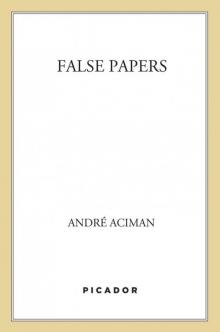 False Papers
False Papers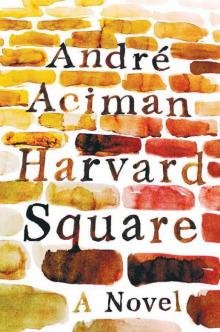 Harvard Square
Harvard Square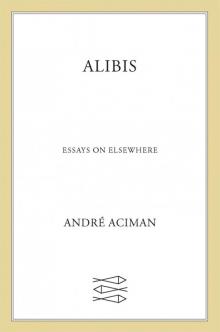 Alibis
Alibis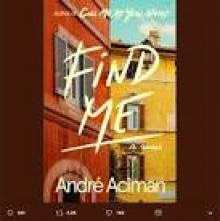 Find Me
Find Me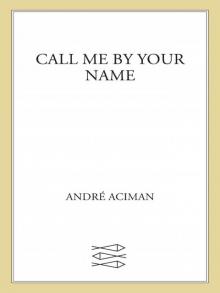 Call Me by Your Name
Call Me by Your Name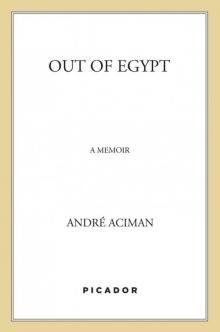 Out of Egypt: A Memoir
Out of Egypt: A Memoir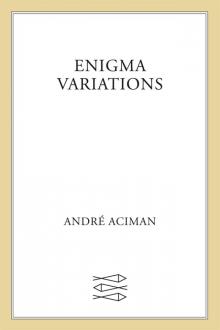 Enigma Variations
Enigma Variations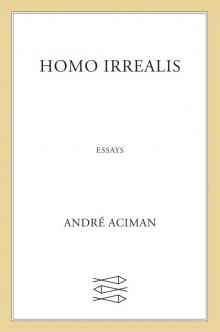 Homo Irrealis
Homo Irrealis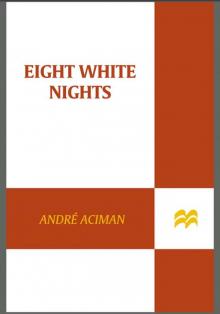 Eight White Nights
Eight White Nights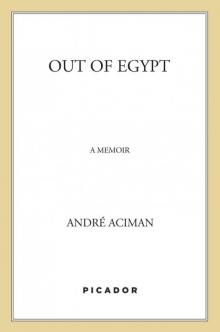 Out of Egypt
Out of Egypt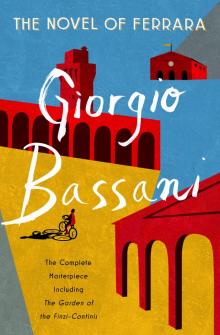 The Novel of Ferrara
The Novel of Ferrara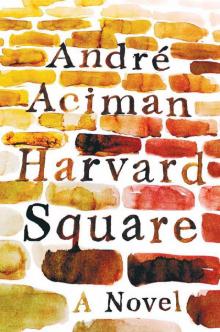 Harvard Square: A Novel
Harvard Square: A Novel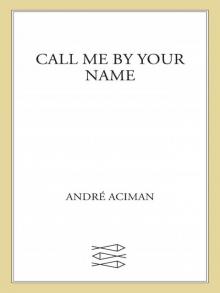 Call Me by Your Name: A Novel
Call Me by Your Name: A Novel